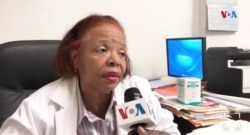French Beninese writer and activist Kemi Seba is in Haiti this weekend on a humanitarian mission.
Seba traveled to the Caribbean nation to show support for the PetroChallenger anti-corruption movement and for the residents of the poorest slums of the capital.
VOA Creole spoke with the activist as he was distributing sanitary kits in Port-au-Prince.
“We wanted to show that we are capable and that we don’t have to wait for the government to act, we can take action ourselves to show our support," Seba said.
"Although we have meager resources we only exist when we can share what we have with others in the context of this dimension, this dynamic,” he added. “We have medical staff with us, midwives, specialists who are not only distributing the kits but also doing free consultations. They are volunteers who gave their time to make this happen.”
The sanitary kits contained items such as soap, toothpaste and medicine. Seba said his NGO bought the medicine, which it distributed with the help of local doctors who accompanied them. While the kits don’t address everyone’s needs, he said they do contain basic items that can help with some of the people’s most urgent needs.
“We wanted to do this because Haiti is a source of black pride worldwide, and because Haiti faces an extremely difficult situation now because of this crisis, which affects the social and economic sectors of the country,” Seba said. “Many are unable to purchase medicine because they have not been paid for five months.”
Haiti’s health sector has suffered during the anti-corruption and anti-government protests that intensified in February of this year. The country’s health sector took to the streets in October, joining anti-corruption protesters to decry the deplorable conditions such as lack of water, electricity and sanitation, which has jeopardized health care workers' ability to care for the sick.
“The crisis has had a devastating impact on us,” Dr. Jessy Adrien, executive director of the government university hospital, told VOA Creole in October. “Patients are unable to reach us and neither are medical staff due to the barricades in the streets.”
Adrien said the crisis has also created a human resource shortage and a dangerous sanitary situation.
“For over three or four weeks, there has been no trash collection and this has created a dangerous, deadly sanitary condition, whereby germs and bacteria are multiplying. For hygienic reasons we must be able to dispose of these biohazards efficiently," she said.
During a September 20 protest, a young doctor working at a Port-au-Prince hospital told VOA: “Sometimes we’re unable to get to the hospital due to the fuel shortage. ... A child died recently at our hospital due to this fuel shortage. People can’t live like this.”
The protests that have swept Haiti were sparked by a fuel price increase in July 2018. They have intensified and swept the nation since then, with thousands taking to the streets on a weekly basis to demand President Jovenel Moise step down. Protesters accuse him of being corrupt and being incapable of resolving the country's problems.
President Moise denies the corruption allegations and in recent weeks has taken steps to address the protesters' concerns, such as naming new Cabinet ministers, visiting local businesses, and speaking directly to the people on traditional and social media. He has also called for a national dialogue to discuss ways to resolve the political impasse, but the opposition has repeatedly rejected the offer.
Activist Seba told VOA he hopes his effort will spark future progress.
“We hope this will not be a just drop in the bucket, but rather the beginning of a process to address this issue with sister institutions and medical partnerships who are already working here. I want to especially thank the medical staff who helped us bring this mission to fruition today,” he said.
The local residents, who did not wish to be photographed, expressed gratitude and thanks to Seba and his team for taking the time to visit them and address some of their most urgent needs.
Jacquelin Belizaire and Matiado Vilme in Port-au-Prince contributed to this report.






